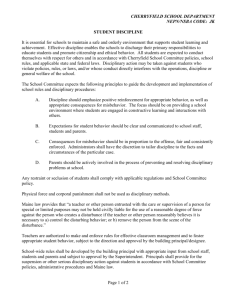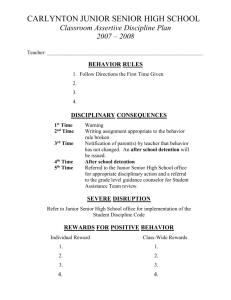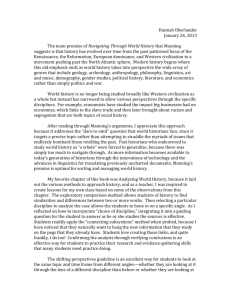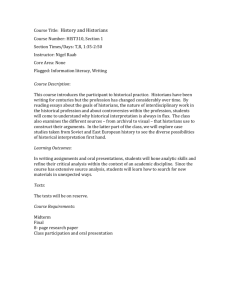booth - Higher Education Academy
advertisement
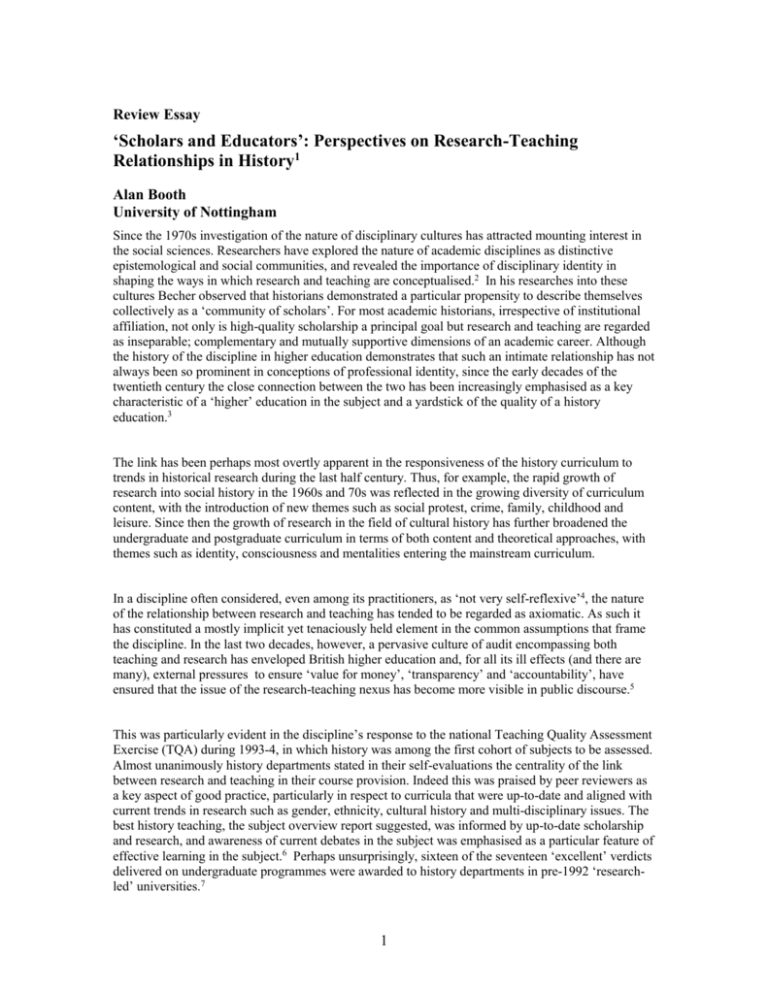
Review Essay ‘Scholars and Educators’: Perspectives on Research-Teaching Relationships in History1 Alan Booth University of Nottingham Since the 1970s investigation of the nature of disciplinary cultures has attracted mounting interest in the social sciences. Researchers have explored the nature of academic disciplines as distinctive epistemological and social communities, and revealed the importance of disciplinary identity in shaping the ways in which research and teaching are conceptualised.2 In his researches into these cultures Becher observed that historians demonstrated a particular propensity to describe themselves collectively as a ‘community of scholars’. For most academic historians, irrespective of institutional affiliation, not only is high-quality scholarship a principal goal but research and teaching are regarded as inseparable; complementary and mutually supportive dimensions of an academic career. Although the history of the discipline in higher education demonstrates that such an intimate relationship has not always been so prominent in conceptions of professional identity, since the early decades of the twentieth century the close connection between the two has been increasingly emphasised as a key characteristic of a ‘higher’ education in the subject and a yardstick of the quality of a history education.3 The link has been perhaps most overtly apparent in the responsiveness of the history curriculum to trends in historical research during the last half century. Thus, for example, the rapid growth of research into social history in the 1960s and 70s was reflected in the growing diversity of curriculum content, with the introduction of new themes such as social protest, crime, family, childhood and leisure. Since then the growth of research in the field of cultural history has further broadened the undergraduate and postgraduate curriculum in terms of both content and theoretical approaches, with themes such as identity, consciousness and mentalities entering the mainstream curriculum. In a discipline often considered, even among its practitioners, as ‘not very self-reflexive’4, the nature of the relationship between research and teaching has tended to be regarded as axiomatic. As such it has constituted a mostly implicit yet tenaciously held element in the common assumptions that frame the discipline. In the last two decades, however, a pervasive culture of audit encompassing both teaching and research has enveloped British higher education and, for all its ill effects (and there are many), external pressures to ensure ‘value for money’, ‘transparency’ and ‘accountability’, have ensured that the issue of the research-teaching nexus has become more visible in public discourse.5 This was particularly evident in the discipline’s response to the national Teaching Quality Assessment Exercise (TQA) during 1993-4, in which history was among the first cohort of subjects to be assessed. Almost unanimously history departments stated in their self-evaluations the centrality of the link between research and teaching in their course provision. Indeed this was praised by peer reviewers as a key aspect of good practice, particularly in respect to curricula that were up-to-date and aligned with current trends in research such as gender, ethnicity, cultural history and multi-disciplinary issues. The best history teaching, the subject overview report suggested, was informed by up-to-date scholarship and research, and awareness of current debates in the subject was emphasised as a particular feature of effective learning in the subject.6 Perhaps unsurprisingly, sixteen of the seventeen ‘excellent’ verdicts delivered on undergraduate programmes were awarded to history departments in pre-1992 ‘researchled’ universities.7 1 Despite considerable dissatisfaction in the discipline with the way in which the exercise had been conducted, it was notable that three years later in a report to the Quality Assurance Agency on standards in history degree programmes, the opportunity offered by the TQA exercise and the national Research Assessment Exercise (RAE) of 1996 to link research and teaching in a direct and forceful fashion was eagerly seized upon. In this report by a national subject association, based upon widespread consultation across the sector, it was stated: In constructing their programmes, departments and subject groups draw heavily on the research interests of their members. The Working Party believes that on the whole the best teaching is likely to come from people active in publication, research and scholarship. This is born out by the combined results in History of the RAE and the TQA.8 Throughout a protracted period of public scrutiny during the 1990s, however, the exact nature of the link between research and teaching remained only thinly sketched out within the discipline. When demanded by external stakeholders, statements about the teaching-research connection were largely articulated in terms of curriculum content and the subject expertise of academic staff. One historian put this dominant view succinctly in a response to an annual survey of university history published in the magazine History Today. ‘The range (of courses) here’, he commented, ‘is largely determined by the research expertise of staff; we believe that it is essential for students to hear it from the experts … as research underpins teaching so much’.9 Nor has the shorthand of ‘research-led’, ‘researchinformed’ and ‘research-oriented’ teaching helped the clarity of discussion; for all of these terms are used interchangeably by departments seeking to assert the indivisibility of the link. Griffiths suggests that a distinction might be made between research-led teaching, where the tutor’s own research interests fashion curricular content and students learn by transmission from the ‘expert’ tutor; research-oriented teaching, where students learn about the processes of research, the processes of knowledge creation are emphasised as much as knowledge acquisition in the curriculum, and the research experiences of staff are brought to bear in a more diffuse fashion; and research-based teaching, where students themselves learn as researchers through an enquiry-led curriculum. In making an explicit effort to reduce the terminological confusion in this area, these distinctions provide a useful starting point for the clarification of terms needed in History.10 Public statements about the research-teaching nexus, such as those used to illustrate disciplinary attitudes so far, rarely, of course, reflect the complexity of private discourse. This is revealed in the following survey of views in a single history department during the run-up to an external evaluation of teaching. Asked how they would describe the links between their teaching and research, the following represent the range of responses among the academic staff. The key book (on several modules I teach) was researched, edited and largely written by me therefore the research element directly feeds into my teaching. Major themes I teach are all areas I’ve researched and published in [gives long list of publications]. The modules I teach have always been intimately connected to my research at the level of both empirical context and theoretical framework …my teaching is fully informed by the research I carried out for my monograph. 2 My researches have led to monographs and general surveys … and my second and third year modules rely on these. My third year Special Subject and MA modules are infused with my engagement with recent developments in the field and my experience of researching and writing within it. My research into medieval England feeds into all my teaching … my knowledge of the subject and also of the current (and up to date) secondary literature enables me to introduce the latest concepts and theories to first year undergraduates …When I take my Special Subject, I draw on a body of primary sources and secondary work of which I am not only very familiar but to which I have contributed to myself through articles and books. I have written widely on the area covered in my Special Subject and this enables me to give students a lot of help in deciding what topics to do in their dissertation and guide them in their reading. My research interests are strongly represented in the modules and themes I teach at second and third year level. I do not believe I would be able to judge the quality of the books and articles that I recommend to students unless I was working actively in historical research myself. I would certainly not feel the same sort of active engagement with the material …However, I would also like to stress that the relationship between research and teaching is not simply one way; discussion with students has sometimes opened my eyes to new ways of looking at historical issues and raised new questions, since their lack of experience allows them to ‘think outside the box’ of conventional scholarship. I have always taught courses related to my research interests as I find this is a good way of sparking off interests in students: they enjoy criticising what I have written (and it may well reassure them that I know what I am talking about!). In my teaching students do research themselves in year 2 and 3, not only in the dissertation but for seminars, and all these modules are based on current issues in the research on my period. Having to communicate your work also makes you really think it through, and research I do on my teaching also influences the way I look at what they can do in class. My research active status is an important feeder into my teaching. As well as keeping my students up to date with the ‘cutting edge’ of my field, research is partly what drives my energy and enthusiasm, key attributes of successful teaching. These statements reveal a much richer, and more diverse, picture of the connection between teaching and research than appears in often formulaic public representations. Clearly there is a strong belief in the direct relationship between research and curriculum content; that research is reflected in the curriculum by the subject matter of the modules taught (though even this is seen in more and less sophisticated ways). But we can also see more complex lines of connection being expressed, albeit sometimes tacitly, not least between the skills acquired and employed in the research process and effective teaching and learning, between research and student (and staff) motivation, and between research and curricular progression. In two responses we can also see an explicit recognition of the two-way relationship between research and teaching; that teaching can inform research as well as the other way round, forcing the academic tutor to clarify his or her thinking and stimulating new ideas. In one response a link is also made between subject-based pedagogic research and classroom practice 3 and to research-led learning through student enquiry. In all history curricula contestation of knowledge is central, and most conceptions of the curriculum see students progressing towards greater independence in learning through involvement in enquiry-led projects and research culminating in a final year dissertation, often associated with the Special Subject which provides the point at which teaching and research most clearly intersect. This specialisation through research is extremely common, and in many history departments there is a related commitment to enabling students to become practising historians (a process which also involves them in learning many transferable skills). As MacLean and Barker point out in a small-scale study of progression in the subject, in these history departments ‘academics’ construction of “progression” in student learning that goes beyond the acquisition of general skills are related to their constructions of what it is to do research in their discipline.’ 11 Whilst public statements made about the links between teaching and research in History can appear rather simplistic, more complex connections are being made by practitioners, although these are often implicit rather than explicitly formulated. There are clearly many different ways in which disciplinary practitioners conceptualize the links between their research and teaching, and a growing international literature has begun to explore these differences and the contribution made to academics’ conceptions by their disciplinary cultures.12 Links made, often implicitly, by historians include: Content of modules is informed by academic staff research. Theoretical perspectives from research influence approaches to teaching a topic. Students learn about research methods from modeling by academic tutors. Undergraduate research modules teach students how to do research. Classroom teaching methods adopt a research-based approach, e.g. student-led seminars. Students undertake (individual and group) research projects. Teaching is used directly to test, refine and shape academic staff research findings. Students assist staff with their research projects. Students gain experience of applied research through e.g. work-based learning. Academic staff conduct pedagogic research to enhance their teaching. Without doubt, however, the nature of the relationship has received less systematic investigation in the discipline than it deserves. All the issues raised so far require greater investigation and exposure to community discussion and debate in a manner commensurate with standard research practice in a scholarly discipline. Let me give an example of just one question. Is there a necessary link between doing historical research and being an effective teacher of history? Clearly almost all the historians quoted above suggest an answer in the affirmative, and this is the dominant view in the discipline. However, Stearns suggests an alternative viewpoint, that ‘many excellent [history] teachers do not themselves do research. They must, however, keep up with the findings of leading researchers lest their teaching stagnate.’13 Must historians teaching the subject in higher education be active researchers? Or is it sufficient to have had postgraduate training in historical research? Might indeed today’s vast number of postgraduate or part-time teaching assistants with limited research experience but an enthusiasm for teaching be better teachers than expert researchers whose focus of attention is not upon the history classroom? And what is so essential about being both a researcher and teacher? Is it the knowledge acquired, or the expertise, or the motivation? Will the answer we give be different if our primary purpose is to foster the acquisition of transferable skills or if the goal is to enable students 4 to become practising (or professional) historians? Similarly does the need for a strong connection vary according to year of study? How does it link to notions of progression? We need to explore such questions more carefully than we have so far done. Some historians might maintain that any attempt to divide us into two distinct roles – teacher and researcher – only serves to do violence to our love of our subject which does not exist in neat boxes. Most surveys, indeed, suggest that historians profess the satisfactions of both teaching and research and are distrustful of recent trends in higher education that seem to imply the need for the separation of these expressions of the passion they have for their subject. Yet this can appear a little ingenuous in its shifting of the focus of responsibility to outside agencies. For while the personal satisfaction of both teaching and research is frequently recorded by academic historians, the separation of these two aspects of professional activity is deeply embedded in our disciplinary structures, not least in our systems of reward and recognition. In the prizes, fellowships and senior positions we award research expertise is paramount, whilst teaching ability all too frequently inhabits the margins of disciplinary esteem.14 In a recent survey of British history departments, for example, fifty-five per cent of respondents reported that senior appointments were intended to get the best research candidates, and that ‘in general a focus on research area and quality was a characteristic both of pre- and post- 1992 universities …’ 15 Similarly research was felt to be heavily-weighted in decisions about promotions.16 In such an ill-balanced and hierarchically separated relationship, it might be argued, the links between research and teaching at the discipline level are as much negative as they are positive, working to divert attention from serious attention to pedagogic matters and discouraging exactly the type of investigation that might enable us to forge more sophisticated links between research and teaching. In History we have only begun to explore the complex relationship between research and teaching. Indeed it might be argued that we have still much to discover about our disciplinary conceptions of the meaning of research, scholarship and teaching, and how the nature of these is changing.17 Serious investigation in this whole area is required, not least to enable the discipline to make a more powerful case for its value to external stakeholders in terms of its contribution to employability and active citizenship in the twenty-first century. At the level of the individual history teacher there is a particular need to make clear to students our own conceptions of teaching and research, how they intersect, and why they matter. In other words, our often tacit knowledge and understanding needs to needs to be made explicit if our students are to become effective historians and learners. There is now some useful guidance on how we might do this and construct curricula that promote in a more developed fashion a link that is deeply felt by many academic historians, and some resources are suggested below. Taking forward such a scholarly agenda offers enormous benefits. It can make our teaching and our research more insightful and it can help us to promote the educational value of our discipline. In the longer term it might also play an important role in the reproduction of a discipline whose sense of identity is closely bound up with a union of practice that many practitioners see as currently under threat in higher education. Further Reading For discussion of the research-teaching relationship in theory and practice, see: A. Jenkins, R. Breen & R. Lindsay, Reshaping Teaching in Higher Education (London, Kogan Page, 2003). A. Jenkins & R. Zetter, Linking Research and Teaching in Departments (York, Learning and Teaching Support Network Generic Centre, 2002). M. Healey & A. Jenkins, ‘Strengthening the Teaching-Research Linkage in Undergraduate Courses and Programmes’, in C. Kreber (ed.), Exploring Research-based Teaching (San Francisco, Jossey-Bass, 2006). 5 M. Healey, ‘Linking Research and Teaching to Benefit Student Learning’, Journal of Geography in Higher Education, 29 (2005). There are also many practical resources that in addressing how to enable students to become ‘independent’ learners in history also touch on research-based teaching and learning. The following selection relate specifically to history. A. Booth, Teaching History at University: Enhancing Learning and Understanding (London, Routledge, 2003). G. Timmins, K. Vernon & C. Kinealy, Teaching and Learning History (London, Sage, 2005). P. Stearns, P. Seixas & S. Wineburg (eds), Knowing, Teaching and Learning History (New York, New York University Press, 2000). S. Gillespie (ed.), Teaching Students to Think Historically (Washington DC, American Historical Association, 1999). Higher Education Academy Subject Centre for History, Classics & Archaeology: http://www.hca.heacademy.ac.uk/resources/TDG/reports. ‘History Matters’: http://historymatters.gmu.edu ‘Senior Essay in History at Yale’: http://www.yale.edu/history/senior-essay. ‘Reacting to the Past’: http://www.barnard.edu/reacting Contact details: Dr Alan Booth School of History University of Nottingham Nottingham NG7 2RD alan.booth@nottingham.ac.uk 1 References This commentary focuses upon the research-teaching nexus in British higher education, though there are many similarities in the kinds of issues in other countries. See, for example, P. Stearns, Meaning over Memory: Recasting the Teaching of Culture and History (Chapel Hill, North Carolina Press, 1993). 2 See, for example, T. Becher and P. Trowler, Academic Tribes and Territories: Intellectual Enquiry and the Cultures of Disciplines (Buckingham, Open University Press, 2001); R. Neumann, S. Parry & T. Becher, ‘Teaching and Learning in their Disciplinary Contexts: a Conceptual Analysis’, Studies in Higher Education, 27 (2002), pp.405-17; A. Biglan, ‘The Characteristics of Subject Matter in Different Scientific Areas’, Journal of Applied Psychology, 57 (1973), pp.195-203; D. Kolb, Experiential Learning: Experience as a Source of Learning and Development (New York; Prentice Hall, 1984); M. Huber & S. P. Morreale (eds), Disciplinary Styles in the Scholarship of Teaching and Learning (Washington D.C., American Association of Higher Education, 2002). 3 On the early history of the discipline as a medium of education in higher education, see R. Soffer, Discipline and Power: The University , History and the making of an English Elite (Stanford, CA, 1994); P. Slee, Learning and a Liberal Education: The Study of Modern History in the Universities of Oxford, Cambridge and Manchester 18001914 (Manchester, Manchester University Press, 1986). 6 See the comments of the editors of the leading historical journal Past and Present: C. Wickham and L. Roper, ‘Past and Present after Fifty Years’, Past and Present, 176 (2002), p.5. 5 On this background, see G. Timmins, K. Vernon & C. Kinealy, Teaching and Learning History (London, Sage, 2005), ch.1. 6 See Subject Overview Report: Quality Assessment of History (Bristol, Higher Education Funding Council for England, 1994). This linkage between teaching and research has continued to important in more recent checklists for QAA Subject Reviews and Developmental Engagements. 7 For the history community’s critical response to this process, see History at the Universities Defence Group, Report of a Working Party to Review the Teaching Quality Assessment of History (London, HUDG, 1994). 8 History at the Universities Defence Group, Standards in History: Final Report of a Working Party of the HUDG to the Quality Assurance Agency (London, HUDG, 1998), pp.9-10. 9 A. Barker, ‘University History’, History Today, 47 (1997), p.58. This, of course, is to assume that the ‘expert’ researchers are actually teaching and that modules are not being taught by the growing army of part-time staff. 10 A means of separating out these terms and making them meaningful is offered by R. Griffiths, ‘Knowledge Production and the Research-Teaching Nexus: The Case of the Built Environment Disciplines’, Studies in Higher Education, 29 (2004), pp. 709-26. 11 For some reflections on this see M. MacLean and H. Barker, ‘Students Making Progress and the “Research-Teaching Nexus”’, Teaching in Higher Education, 9 (2004), pp. 407-419. 12 See, for example, Griffiths, op. cit. M. Healey, ‘Linking Research and Teaching: Exploring Disciplinary Spaces and the Role of Inquiry-based Learning’, in R. Barnett (ed.), Reshaping the University: New Relationships between Research, Scholarship and Teaching (London, Open University Press, 2006); R. Neumann, S. Parry & T. Becher, ‘Teaching and Learning in their Disciplinary Context’, Studies in Higher Education, 27 (2002); T. Becher & P. Trowler, op. cit. 13 Stearns, op.cit., p.32. 14 For discussion of this see A. Booth, ‘Rethinking the Scholarly: Developing the Scholarship of Teaching in History’, Arts & Humanities in Higher Education, 3 (2004), pp.247-60. In the United States see R. Diamond & B. Adam (eds), The Disciplines Speak: Rewarding the Scholarly, Professional, and Creative Work of Faculty (Washington DC, American Association for Higher Education); T. Bender et al., The Education of Historians for the Twenty-First Century (Urbana, University of Illinois Press, 2004), p.19. 15 See C. Brooks, J. Gregory & D. Nicholls, ‘Teaching and the Academic Career’, in A. Booth & P. Hyland (eds), The Practice of University History Teaching (Manchester, Manchester University Press, 2000); 16 Idem, pp.22-3. 17 For more on trends in thinking about teaching and scholarship in history, see Booth, ‘Rethinking the Scholarly; A. Booth, Teaching History at University: Enhancing 4 7 Learning and Understanding (London, Routledge, 2003); G. Timmins, K. Vernon & C. Kinealy, Teaching and Learning History (London, Sage, 2005). 8


